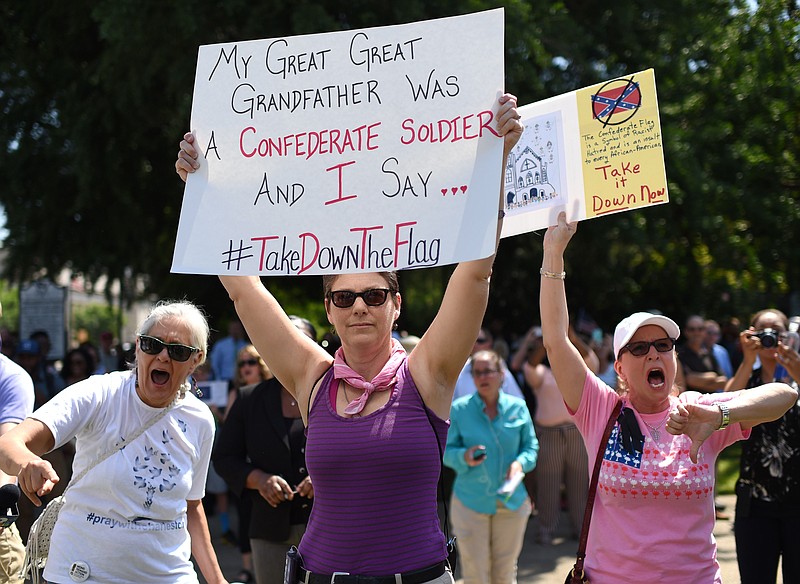America this week is riding the wave of our unfinished business: The deep American curse of racism.
Public revulsion is clear in the wake of a boy-man too young to understand hate killing nine people in a church service in Charleston S.C. - simply because they were black.
Dylann Roof, who looks as though he should be wearing a Scout uniform instead of displaying the trappings of a white supremacist with a Confederate flag and a gun, wrote in what investigators have called a manifesto that he learned his new and twisted credo from the website of the Council of Conservative Citizens, a white supremacist group founded by Earl Holt III.
Read more
* South Carolina's governor calls for Confederate flag to come down* After Charleston, South revisits its many Confederate images* South Carolina lawmakers vote to debate removing Confederate flag from Statehouse* State officials target Confederate symbols amid growing uproar* Removal of Confederate flag won't change polarized America* What others are saying about Confederate flag uproar
But until Americans began to watch Charleston's grief turn to forgiveness for Roof, it was as though we simply didn't see where the hate came from. We didn't see how anachronistic hate groups like the CCC misappropriated the Confederate flag or how politicians wrapped themselves in states' rights talk as just another symbol for partisanship and classism.
As the tears fell for Charleston - and for America - anti-hate questions became almost viral.
Why haven't we considered the Confederate flag in the same way that we see a swastika: another symbol of another war with too many victims?
Why don't we track white supremacist websites like terrorist websites?
Why don't we see the Charleston shooting as an act of political terrorism - or, put another way, homegrown terrorism, the term coined for Timothy McVeigh after he blew up the Oklahoma City Federal Building?
Why had we become numb?
Yet in the wake of the Charleston tragedy, there is a tingle of awakening.
South Carolina Gov. Nikki R. Haley on Monday called for South Carolina lawmakers to do what just a week ago seemed politically impossible - remove the Confederate battle flag from the State House grounds to a museum. The battle flag hasn't always flown there. It was mostly forgotten after the Civil War ended, but it rose again and became a fixture there 53 years ago - shortly after George Wallace raised an identical one over the Alabama Capitol as Georgia had done in 1956 - all to protest the enforcement of the Supreme Court's ruling against segregated schools in Brown v. Board of Education.
But on Monday, South Carolina Republican Rep. Norman Brannon, who has pledged to carry a bill to bring the Confederate battle flag down, said the death of fellow lawmaker, South Carolina Senate President Clementa Pinckney, had opened his eyes: "I had a friend die on Wednesday night for no other reason than he was a black man," Brannon said, adding that he should have fought to take the flag down years ago but, "I didn't do my job."
Today, Wal-Mart, Sears, eBay and other corporate retailers all are jumping on the wagon, announcing they will remove items carrying the flag that now is clearly seen as a symbol hijacked for hate.
Today, too, the GOP presidential candidates, past and present, sighed with relief after spending days squirming with claims of "states' rights" over the flag - especially after it became known that Holt, the founder of the Council of Conservative Citizens and twister of malformed young minds, had contributed thousands of dollars to Ted Cruz, Rick Santorum, Rand Paul, Scott Walker, Michelle Bachman and Mitt Romney.
Finally there is President Barack Obama, who will travel to Charleston on Friday to deliver the eulogy at Pinckney's funeral. But already he is speaking frankly about America's sick racial biases in a way that he never has before.
On Monday he told comedian Marc Maron in a podcast that although race relations have improved over his lifetime, America is not "cured" of racism.
"And it's not just a matter of it not being polite to say n--- in public," Obama said. "Societies don't completely erase everything that happened 200 to 300 years prior."
When the shock wore off, we were left again with the tingle of raw nerves awakening after years of cramped neglect.
Why had we become obsessed with the n-word, but ignored the realities of life and death and love and hate in America's ethnic patchwork of people and freedoms?
Why had we decided to trade our faith in good people and core values for political, religious and ethnic labels?
There is much to do, and we can do it. Charleston and its forgiveness teach us that.
